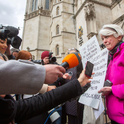Constitutional law should rarely be exciting. A constitution sets the agreed parameters of day-to-day political action: the rules of the game. In a happy polity, those parameters should not often be stressed or undermined.
But since the Brexit referendum of 2016 the United Kingdom has been a particularly unhappy polity, and successive Conservative governments have stressed and tested the very limits of the constitutional arrangements of the United Kingdom.
We have long been drifting into the arena of the politically unwell, making an enemy of our constitutional future. And now, drenched in the heavy rain, we have a prime minister who appears to have called a general election by mistake. Will we never be free?
Twice the Supreme Court has been obliged to put the prime ministership back in its proper constitutional box, quashing attempts to usurp parliament. Ministers have routinely sought to pass legislation that would enable the government to break the law. An Act of Parliament has even been passed to deem the unsafe country of Rwanda as legally safe.
And so, when the latest Tory prime minister announces a sudden general election, minds begin to race: can the dissolution of this parliament be somehow revoked by livid government backbenchers, upset at a decision and timing they see as increasing their risk of losing? Could there be a switch in the governing party leadership that would mean the general election is cancelled? News reports suggest desperate backbenchers may seek to somehow reverse the calling of a general election. This is unlikely to happen. But what could they try to do?
This is uncharted constitutional territory. As with many constitutional matters over the last eight years, a question arises which not only does not have a ready answer, but is a question that nobody had ever thought of previously asking.
The best answer is perhaps that the general election could theoretically be revoked until parliament is actually dissolved on 30th May. But a reversal would either require a change of heart by the current prime minister, or a change of the current prime minister. The latter would require the King to be placed in the position, in the next week, of selecting a new premier who can command the confidence of the House of Commons. Unless Sunak resigns, it is hard to see how this could happen in the time available.
An amusing alternative would be if disgruntled government backbenchers bring a judicial review of the act of proroguing and then dissolving the current parliament. This would mean that the politicians who hissed and sneered at the spirited (and successful) legal applications of Gina Miller and others to the Supreme Court in 2017 and 2019 would be making a similar attempt to invite judicial intervention and challenge the ending of a parliament. It is a mark of the times that such possibilities no longer seem incredible.
But, standing back, it must be remembered that the Fixed-term Parliaments Act of 2011 was supposed to formalise and normalise five-year parliaments, taking prime ministerial politics out of the calling of general elections.
Yet the import of that statute was deftly sidestepped with the general elections in 2017 and 2019, and the Act itself was repealed in 2022 to the claps and cheers of those government backbenchers now aghast at this “early” general election. Constitutional quick fixes like that 2011 Act turn out not to be easy solutions to constitutional problems. Similarly, those who celebrate the repeal of such quick fixes can come to regret it soon after.
Perhaps, after this general election, constitutional matters will calm down and constitutional law textbooks can return to being updated once every couple of decades, instead of needing weekly updates. Perhaps.
Or perhaps moves towards Irish unification and Scottish independence, and towards a closer and more sustainable relationship with the European Union and towards a reformed House of Lords, may throw up new constitutional issues. Who knows? We may be in for another few years of constitutional excitement.














